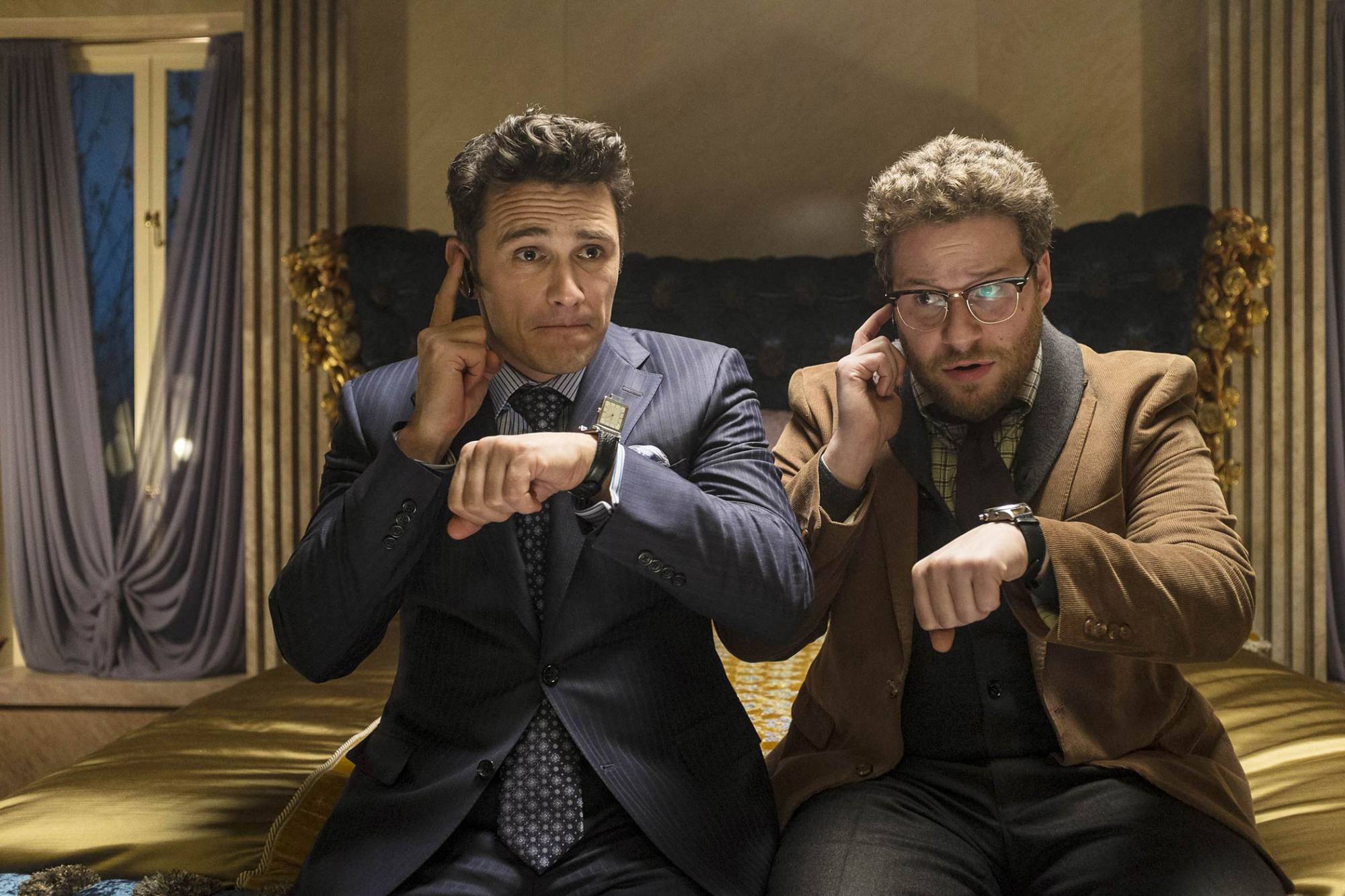

Seth Rogen and James Franco are back with “The Interview,” another one of their infamous “circle-jerks” with a twist: Arrogant talk show host Dave Skylark (Franco) and his producer Aaron Rapoport (Rogen) get the once-in-a-lifetime opportunity to interview the dictator of North Korea, Kim Jong-un (Randall Park). With all the controversy surrounding the film’s release, I expected something uproariously clever or at least intelligently offensive. Sadly, “The Interview” ended up being very average.
“The Interview,” directed by Rogen and Evan Goldberg, attempts to satirize American mainstream media and the North Korean government. It juxtaposes a very flippant Franco with a more serious Rogen. Skylark makes millions off questioning celebrities about their drug habits and sex lives – the best point of the movie is when Eminem declares that he’s gay five minutes in – while Rapoport simply wants to be a “real journalist.” When they land an exclusive interview with Kim Jong-un, who is a longtime fan of Skylark’s show, they are asked by the CIA to assassinate Kim. Rapoport wants to follow the rules, while Skylark decides to ditch the CIA-approved poison-carrying-case for a Gucci bag. When Skylark befriends Kim and bails on the plan, Rapoport takes on the mission himself. In addition to following a predictable plot, the film uses predictable jokes: You’ve got Seth Rogen laughing over the word “dong,” you’ve got your gratuitous Asian girl fantasy scene, you’ve got your dog-eating jokes, you’ve got your Koreans who can’t speak English well. It’s all very rudimentary comedy, poking fun at overused Asian stereotypes. James Franco’s character is clearly the one to roll your eyes at: He says “Konnichiwa” to the Korean welcoming committee, he asks out loud if everyone in North Korea is “starving and dying,” and he tries to karate-chop Rapoport’s crush (Kim’s Chief Propagandist Sook Yung Park played by Diana Bang). Obviously, Skylark represents every bigoted white male American wrapped up in a handsome satirical package, ready for us to critique. That is, if we ever stop pulling at the corners of our eyes. We’re supposed to like Aaron Rapoport, who is sensitive, sees an Asian woman as the multi-faceted human being that she is, and only sometimes makes fun of Korean accents. He’s supposed to represent some sort of ideal, whatever that is.
I have one question: What is “The Interview” trying to do? Is it trying to humanize Kim Jong-un? Is it trying to criticize American imperialism? Is it trying to expose the injustice occurring inside North Korea? Or is it simply a story about how Skylark goes from being a completely sorry excuse for a journalist to an almost-competent excuse for a journalist? I’ll admit it’s a well-researched movie; for instance, as someone who has spent many a long hour travelling through China, I appreciated the movie’s depiction of a Chinese sleeper train. But the political message it conveys, if any, wildly misses the point. In a bizarre turn of events, Sook switches sides, telling Skylark and Rapoport that in order to topple the regime, they must depict Kim as a vulnerable, flawed human being and force him to answer for his crimes.
“The people need to be shown that he is not a god, that he is a man. Then they will be ready for change,” Sook says. Yes, since two-thirds of North Koreans starve because they’re not ready for change.
I’m surprised the North Korean government had such a problem with this movie. It doesn’t show us the everyday suffering of North Koreans; it doesn’t inspire any sort of rage or indignation. We see that Kim Jong-un owns a large collection of luxury cars, but couldn’t we have predicted that anyway? The utter lack of political punch in “The Interview” only seems to support rumors that the North Korean government wasn’t involved in the hack on Sony. We get glimpses of the lived realities of the people – through a fake grocery store selling fake fruit and shots of what appears to be a poor North Korean family – but the extent of inequality and political oppression is completely ignored. Randall Park is a funny Kim Jong-un, but is an inadequate villain, appearing more insecure than truly evil. In Rogen and Goldenberg’s ambivalent treatment of Kim, the audience does not receive a clear critique of the regime.
Franco is appropriately bombastic, though as always a little too over-the-top, but Rogen pulls off a surprisingly sympathetic performance. If you want real laughs, go watch “This is the End,” Rogen and Goldberg’s superior collaboration. If you want to actually learn something about North Korea, scroll through the country’s Wikipedia page.
“The Interview” tries to critique the white man’s conquest: Two American men go to an underdeveloped nation for a weekend, do literally nothing of value, and are deemed heroes who have saved the “little people.” It’s supposed to be satire, yes, but it’s easy to misinterpret the film, and as a result it misses its chance to become consequential political commentary.
“How many times will the U.S. make the same mistake?” Sook asks. “The Interview” does make one good point: Americans really aren’t the answer to North Korea’s problems.
“The Interview” is now streaming on Netflix.